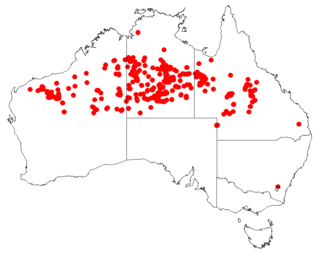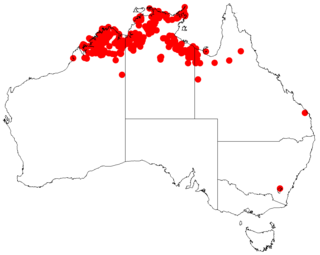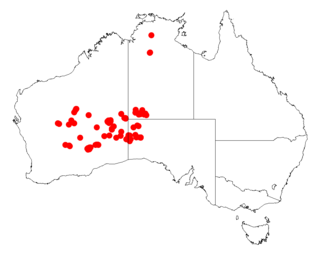
Acacia kempeana, commonly known as wanderrie wattle, witchetty bush or granite wattle, is a shrub in subfamily Mimosoideae of family Fabaceae that is endemic to arid parts of central and western Australia.

Acacia monticola, commonly known as red wattle, gawar, curly-bark wattle, curly-bark tree and hill turpentine, is a species of plant in the legume family that is native to northern Australia.

Acacia acradenia, commonly known as Velvet Hill wattle and silky wattle, is a shrub or tree belonging to the genus Acacia and the subgenus Juliflorae. It is native to northern and central Australia. The Indigenous Australian group the Nyangumarta peoples know it as walypuna the Alyawarr call it ampwey, the Jaminjung and Ngaliwurru know it as Mindiwirri, the Jaru as binbali or gundalyji, the Kaytetye as ampweye or arwele and the Warlpiri as ngardurrkura.

Acacia adsurgens is a shrub belonging to the genus Acacia and the subgenus Juliflorae. It is native to the northern areas of Australia.

Acacia areolata is a shrub belonging to the genus Acacia and the subgenus Juliflorae that is endemic to north western Australia.
Acacia gibsonii, commonly known as Gibson's wattle, is a shrub belonging to the genus Acacia and the subgenus Juliflorae.

Acacia oncinocarpa is a shrub or tree belonging to the genus Acacia and the subgenus Juliflorae that is endemic to northern Australia.

Acacia paraneura, commonly known as weeping mulga, is a tree or shrub belonging to the genus Acacia and the subgenus Juliflorae. It is native to arid regions of Australia. The Indigenous Kurrama peoples know the tree as warlun.

Acacia plectocarpa is a tree or shrub belonging to the genus Acacia and the subgenus Juliflorae that is endemism to north western Australia.

Acacia retinervis is a tree or shrub belonging to the genus Acacia and the subgenus Juliflorae endemic to northern western Australia.

Acacia symonii, also known commonly as Symon's wattle, is a tree or shrub belonging to the genus Acacia and the subgenus Juliflorae that is endemic to parts of arid central Australia.

Acacia tenuissima, commonly known as narrow-leaved wattle, broom wattle, minyana, slender mulga or slender wattle, is a shrub belonging to the genus Acacia and the subgenus Juliflorae endemic to temperate and tropical areas of Australia. Indigenous Australians the Kurrama peoples know the plant as Janangungu and the Banyjima know it as Murruthurru.

Acacia dictyophleba, also known as the sandhill wattle, waxy wattle and feather veined wattle, is a shrub belonging to the genus Acacia and the subgenus Phyllodineae. The Nyangumarta peoples know the plant as Langkur or Lungkun and the Thalanyji know it as Jabandi.

Acacia jasperensis is a shrub or tree belonging to the genus Acacia and the subgenus Phyllodineae that is endemic to north western Australia.

Acacia melleodora, commonly known as scented wax wattle, waxy wattle, honey wattle or honey scented wattle, is a shrub belonging to the genus Acacia and the subgenus Phyllodineae that is endemic to arid parts of central Australia.

Acacia strongylophylla, commonly known as round-leaf wattle, is a shrub of the genus Acacia and the subgenus Phyllodineae endemic to central Australia.

Acacia calcicola is a shrub or tree of the genus Acacia and the subgenus Plurinerves that is native to parts of central Australia. Common names for this species include; shrubby wattle, shrubby mulga, myall-gidgee, northern myall and grey myall. Indigenous Australians the Pitjantjatjara peoples know the tree as ikatuka, the Warlpiri know it as jirlarti and the Arrernte know it as irrakwetye.

Acacia helmsiana, commonly known as Helm's wattle, is a shrub of the genus Acacia and the subgenus Plurinerves that is endemic to arid areas of central and western Australia.

Acacia macdonnelliensis, commonly known as the MacDonnell mulga or the Hill mulga, is a species of Acacia native to central Australia. The Indigenous Australians the Alyawarr peoples know the plant as irrar, the Kaytetye know it as arleth-arlethe or arwele arleth-arlethe and the Western Arrernte peoples know it as irrkwarteke.

Acacia ammobia, commonly known as the Mount Connor wattle, is a species of Acacia native to central Australia. It is regarded as rare in both South Australia and the Northern Territory where it is endemic.






















